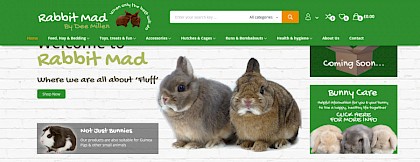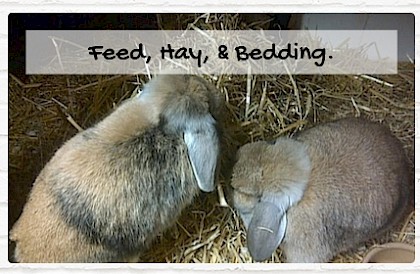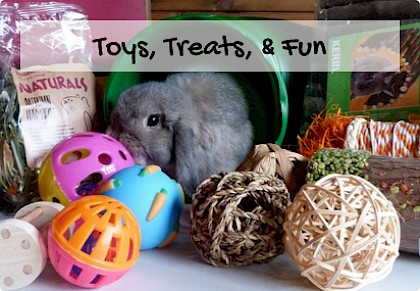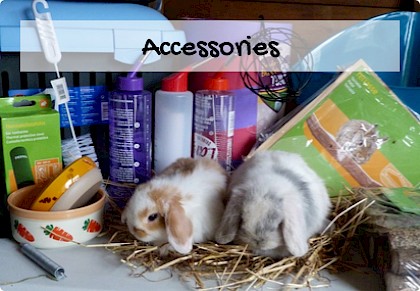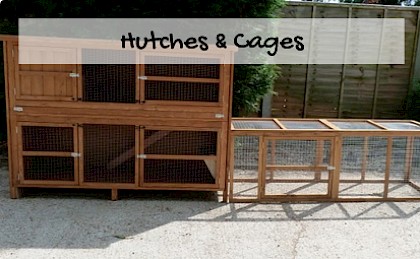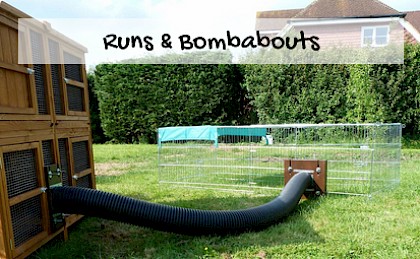Feeding your rabbit
Feeding your Buuny
When feeding your rabbit/s, it is important to remember that they do not need a high level of sugar or protein or a large bowl full of food. Rabbits produce two types of droppings, the round dried one that you will find in abundance and a second type that are soft stools (like brown toothpaste balls all joined together) these are eaten again (a process called coprophagia). This is thought to supply the rabbit with most of its Vitamin B requirement; it also contains healthy bacteria that the rabbit needs to digest their food, this helps to prevent diarrhoea. If a rabbit is over fed they will produce too many of these droppings and will not eat them all, not only are they missing out on the goodness that they provide, but because of the stickiness of this poo it can become stuck around the bottom of the bunny, which can put the bunny at a huge risk of Fly strike which could potential prove to be fatal.Rabbits rely on a stable population of "good" bacteria in their gut; any changes in dietary intake should be introduced gradually to avoid sudden changes in types of bacteria present, as this can result in diarrhoea. Diarrhoea can kill. If possible keep your bunny on the one that it was brought up on.
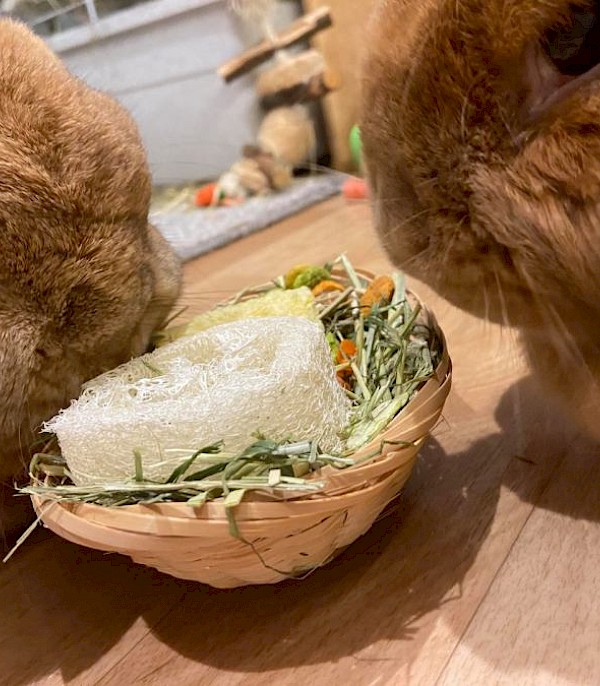
My Rabbits are feed on my own mix of Rabbit food which is Millen Advanced Rabbit food. (The closes alternative is Russell Rabbit mixed with a complete nugget), along with Timothy Hay, Italian rye grass and lovely Meadow Hay. It is advisable not to keep changing your rabbit’s food or hays. If you homed a bunny from us, you would of had a feed measure supplied with your starter kit –please use it to correctly feed the required amount to your bunny. The bulk of the rabbit’s diet is made up of Hays and grasses, these can be alternated, Timothy Hay one day, then Italian Rye Hay, with Meadow Hay always in the bedding area. Hays are crucial to your rabbit's health as it is the main source of fibre/roughage which aids the digestion, helps prevent g.i. stasis and hairballs and eating hays like Timothy and Italian Rye grass help in keeping your rabbit's teeth in good shape and should be available in unlimited quantities to all rabbits at all time,
ADULT RABBITS:
A Netherland Dwarf will only need 1.5oz of rabbit feed, a Mini Lop, Lion Lop, and Lionhead 2-3oz a day. Obesity is common in pet rabbits, and excessive amounts of food should be avoided. When feeding a mixed food the rabbit must eat everything that you give it. If you over feed the rabbit it will only pick out its favorite bits and leave everything else and will not be getting a complete diet. Fibre is of the utmost importance to keep your rabbit fit, healthy and using their teeth correctly. Good quality hay forms 80% of the rabbit’s diet.
So ideally unlimited meadow hay, Timothy hay and Italian Rye- along with a variety of fresh vegetables (these need to be introduced slowly) with a limited amount of rabbit food every day.
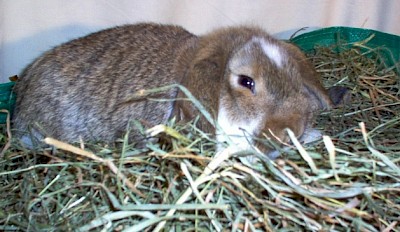
BABY RABBITS:
Baby Rabbits are fed the same as for Adults, apart from fresh vegetables need to be strictly monitored on the effects on the babies tummy, it is best to introduce one vegetable at a time from 14 weeks of age plus. If a high volume of second droppings are being found in the cage, the levels of dried feed or vegetables must be reduced, it is more important that the baby eats these droppings rather than another huge bowl of feed. Your new baby bunny may not be use to any green food this includes grass, so great care must be taken when feeding this to your bunny, as too many greens can kill. The golden rule being any new food a little bit at a time until bunny is use to it. Tit bits can be used to make the bunny come towards you i.e. toast, biscuits, dried fruit, pea or carrot flakes etc.
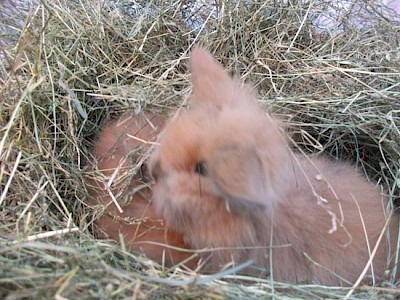
HAY:
Hay is crucial to your rabbit's health as it is the main source of fibre/roughage which aids the digestion, helps prevent g.i. stasis and hairballs and it is helpful in keeping your rabbit's teeth in good shape. Grass hays: meadow or Timothy should be available in unlimited quantities to all rabbits at all times, freeze dried grass should be fed a maximum of 3 times a week, this is a food in its own right, so could replace a measure of feed. Just remember to monitor the rabbits droppings.
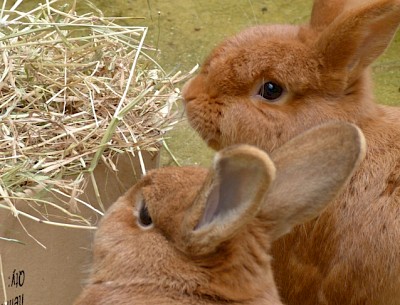
RABBIT FOOD:
Rabbit food should always be fresh. Don't buy more than three month's supply at a time or it may get stale and lose nutritional value.
Rabbits rely on a stable population of "good" bacteria in their gut; any changes in dietary intake should be introduced gradually to avoid sudden changes in types of bacteria present, as this can result in diarrhea. Diarrhea can kill. It is best not to keep swapping and changing your rabbits feed, if it is doing well on the food it was brought up on- why change it?
We have been feeding our own brand "Millen Advance Nugget & Nibbles" for years, many of our rabbits are 8 years old plus, very fit for their ages.
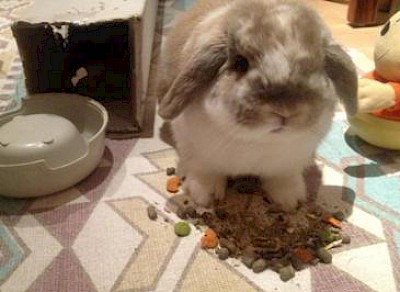

My Rabbits are feed on my own mix of Rabbit food, Millen Advanced Nugget & Nibbles along with our own range of lovely English Meadow Hays, Timothy hay, Italian Rye Grass and a small amount of Millen Munchy Grass
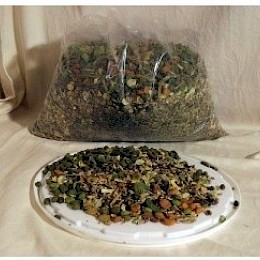
Millen Advanced
A complementary food for rabbits, the Advanced has added deodorizing yucca extract in the form of a nugget to reduce ammonia levels, plus added Verm-X - 100% herbal blend to promote intestinal health. This to be fed in conjunction with forage such as clean hay and freeze dried grass, fresh water must be available at all times. With limited vegetables if your rabbit is use to these. We now longer stock just a Muesli style food, although if feed correctly this is not a problem, we do find rabbits kept as pets do get over feed -so they will just pick out their favourite bits, leaving the stuff that is really good for them. We feed a nugget and nibble as we believe this allows the rabbit to forage.
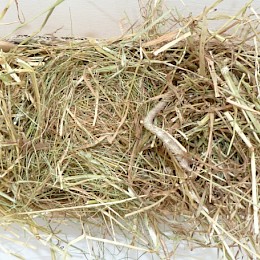
Meadow hay
Last years cut, lovely and green, smells great my bunnies love it. In Fresh English Meadow Hay; I have two types from two different counties of the UK: Sussex, and so soft and sweet. We have two types of Italian rye grass, Big and Stalky and Fine and Gold, an Ultra Timothy hay, Fibre Blend a mix of hays and North American Timothy hay. There will be one that your bunny just can't get enough of. We bag this hay to order, to ensure that it reaches you in tip top condition for you bunny or small pet's enjoyment. These are supplied in 1kg, 2kg, 3kg bags or a money saving 9kg box. Buy two of these and delivery is free to England, and lower Scotland.
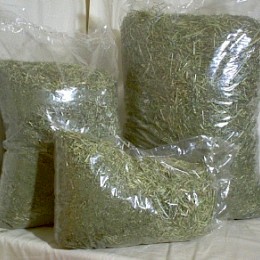
Millen munchy grass
Millen munchy grass is a freeze dried grass, made from pure grass with only the water taken out. Protein 15%, Fibre 32%, Oil 2%, Prosphours 4g/kg. Very good for making a rabbit use it's back teeth correctly. This is a food in it's own right, so can replace a feed, I would advise not feeding this more than 3 times a week. This is a natural product which may vary in appearance throughout the season, this does not affect the nutritional value and the Bunnies love it. more info here
If your not sure what to buy or what your bunnies will like we have a super pack for you to try, if your bunnies love these you can then get the 2.5kg bags
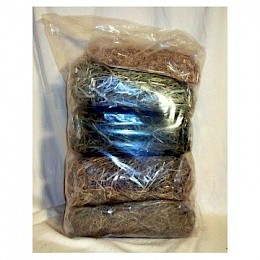
The Fibre Four pack in three sizes
Designed for bunnies and their back teeth...
Pack contains a mix of the above. Great for keeping your bunny munching.
Millen Munchie Grass.
Ultra Timothy Hay.
Meadow Hay-so soft or Sussex
Italian Rye grass in big and stalky or fine and gold.
Water
Clean water must be accessible to rabbits at all times. A sipper water bottle is the best choice because it cannot be contaminated with bedding, food, faeces and urine. Rabbits unfamiliar with a sipper bottle may have to be trained to use it. It is not necessary to add vitamins to the water if the recommended diets are followed. The disadvantages of adding vitamins to the water include; making the water taste disagreeable and promoting bacterial growth. probiotic can be added to the water when you first bring your pet home, this will help them settle in. Medications can be added to the water but only under the advice of your vet. If you are not sure whether your bunny is drinking, place a small bowl by the rabbit's water bottle. If a rabbit stops drinking, within a couple of days, it will stop eating. So always check that the bottle is working, by flicking the end. A bottle spring is a useful item for holding the bottle on the cage, these fit the smallest of bottles to the largest.
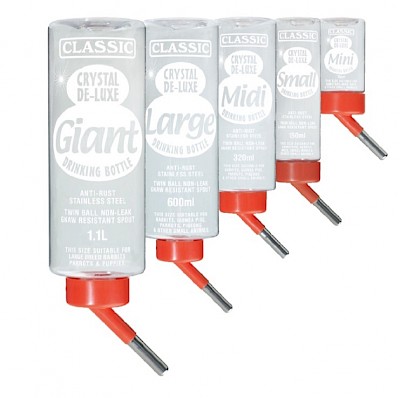
Freezing Water Bottles
I use a product called Vanodine not only does it help to stop the water from freezing, it also stop the bottles from going green in the summer. It keeps the water fresh and clean. it can also if used stronger be used for cage and aerial disinfecting as well as scrubbing out food dishes and litter trays, An idea is to have two bottles on the go, one on the cage with a bottle cover on, the other indoors, when you go out to check your bunnies you swap the bottles over, the rabbits will drink almost straight away because the water will be at room temperature, which they enjoy, and they will soon learn that when it is cold, mummy or daddy will swap bottles. Or you can mount the bottle inside the cage with the bottle and holder, and then the warmth of the bunnies will stop it freezing.
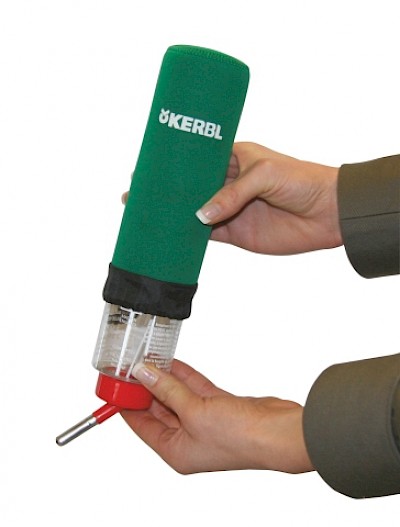

For all your rabbit needs
Hutches, Indoor cages, accessories, feed and bedding plus toys, treats and every thing you could need. All in one place

